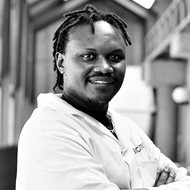Pump-Priming Project Awards - Round 6 Awardees
Listed on this page are the successful projects awarded in our sixth round of pump priming.
Targeted genetic manipulation of gonococcal rmp and O-antigen genes to develop an improved gonorrhoea vaccine
Project Lead and Collaborators
Project Lead and Collaborators
Dr Thomas Belcher
Post-doctoral Scientist
University of Oxford, UK
Collaborators:
Professor Calman MacLennan, Professor of Vaccine Immunology, University of Oxford, UK
Professor Peter Beernink, Associate Professor in Residence, University of California San Francisco, USA
Professor Lisa Lewis, Associate Professor, UMass Chan Medical School, USA
Professor Christine Rollier, Professor of Vaccinology, University of Surrey, UK
Professor Magnus Unemo, Professor and Director, WHO Collaborating Centre for Gonorrhoea and other STIs, Örebro University Hospital, Sweden
Professor Andrew Gorringe, Professor UK Health Security Agency, UK
Dr Seanette Wilson, Senior Project Manager, Biovac Institute, South Africa

Project overview
Project overview
Summary
Gonorrhoea is a sexually transmitted infection which can cause severe disease, including pelvic inflammatory disease, ectopic pregnancy and infertility in women. It disproportionally affects women in low- and middle-income countries. Increasing antibiotic resistance among isolates threatens a global public health catastrophe.
We are currently developing a vaccine candidate against gonorrhoea consisting of bacterial surface blebs known as native outer membrane vesicles (NOMVs) ready for clinical trials. With the proposed project, we aim to improve our NOMVs by genetically modifying the strain of gonococcus used to produce them in two ways and thereby improve levels of possible protection.
First, we will perform targeted deletion of the Rmp surface protein which is thought to be the focus of non-protective immune responses, to prevent the development of unhelpful immunity. Second, we will stabilise the production of lipo-oligosaccharide O-antigen surface sugars thought to be the target of protective immune responses, to increase protective immunity.
The new strains will be tested for their fitness and ability to produce NOMVs. Purified NOMVs will be characterised in a series of lab tests and used to test vaccinate mice. The antibodies produced through immunisation will be assessed for their ability to bind and kill a range of representative global gonococcal strains. At the end of the study, further support will be applied for to test the ability of promising new NOMVs to increase clearance of gonococcal infection in an animal model.
Project outcomes
The project objectives were to develop novel vaccines against gonorrhoea based on native outer membrane vesicles (NOMVs), which are naturally released from some bacteria. Not much is known about the antigens involved in protection against gonorrhoea. 2C7 is a specific part of the bacteria causing gonorrhoea, and antibodies against 2C7 can protect against gonorrhoea infection in a mouse model. The expression of 2C7 is not stable in gonorrhoea. We successfully introduced mutations into gonorrhoea bacteria which stabilised the presence of 2C7. We demonstrated that 2C7 was indeed stabilised, and from these mutants, we were able to produce vaccine candidate NOMVs, and evaluate their ability to generate an immune response in a mouse model.
Gonorrhoea also expresses a protein called Rmp, which acts as a decoy for the bacteria by stimulating antibodies in infected people that block the function of protective antibodies against gonorrhoea. It may be beneficial to avoid having Rmp in the vaccine candidates. We successfully mutated the gene rmp, and were able to obtain seven new mutants with rmp mutated in different ways. We produced the resulting vaccine candidates, and investigated their capacity to induce immune responses in mice. The sera from these mice were tested for antibody quantity and quality.
Developing a vaccine to protect against multidrug resistant Acinetobacter baumannii infections
Project Lead and Collaborators
Project Lead and Collaborators
Professor Jeremy Brown
Professor of Respiratory Infection
University College London, UK
Collaborators:
Dr Samantha Palethorpe, PDRA, University College London, UK
Professor Brendan Wren, Professor of Microbial Pathogenesis, London School of Hygiene and Tropical Medicine, UK

Project overview
Project overview
Summary
Acinetobacter baumannii causes serious infections in patients admitted to hospital with other medical problems. A. baumannii infections are particularly common in Asian low- and middle-income countries (LMICs) such as Thailand, where it also causes infections caught by people outside of hospital. A. baumannii has very high levels of resistance to multiple antibiotics which makes it particularly difficult to treat and as a result, A. baumannii infections have a >30% mortality and are responsible for about 15,000 deaths per year in Thailand alone. Hence, there is a dire need for a vaccine to prevent serious A. baumannii infections, yet there are no existing A. baumannii vaccines and no vaccine candidates have reached clinical trials to date. In a study developing an antibody therapy to treat patients with A. baumannii infections, we have identified multiple A. baumannii proteins that cause immune responses in mice and humans. Antibody to these proteins binds to the bacteria and improves the ability of the body to kill A. baumannii. As well as being good targets for an antibody therapy, these proteins could be effective vaccine candidates. The work planned in this proposal would test this by investigating how effective these proteins are as vaccines in mouse models of A. baumannii infection. The results would allow us to select the best proteins to take forward in future studies to develop a vaccine that can reduce the significant amount of illness and deaths caused by A. baumannii.
Project outcomes
Acinetobacter baumannii causes serious infections, such as pneumonia, in hospitalised patients with other underlying conditions. These infections are commonly found in Asian low- and middle-income countries (LMICs) where antibiotic use is not well-regulated. A. baumannii is very resistant to multiple antibiotics, making these infections extremely difficult to treat, which often leads to death. For example, mortality rates can be as high as 70%1-6, with around 80% of strains being multi-drug resistant, and some strains that are resistant to last-resort antibiotics1,5,8. Therefore, we are in dire need of a new antimicrobial therapy or vaccine to treat and prevent these multidrug resistant infections. Currently, there are no vaccines in development for A. baumannii.
To approach this, we identified multiple A. baumannii proteins which stimulate an immune response both in mice and in humans during an infection. We have previously shown that antibody to these proteins can bind multiple strains of A. baumannii and can help to inhibit this pathogen. Therefore, our aim was to test the proteins themselves as vaccine candidates in a mouse model of infection.
To test how protective these proteins are as vaccines, mice were vaccinated three times with single proteins. We collected sera from the mice which showed that antibodies from the mice can recognise their respective A. baumannii proteins. We also infected these vaccinated mice with a clinical A. baumannii strain, which showed that some of these vaccines can partially protect against an A. baumannii infection.
Next, we vaccinated mice three times with a combination of the proteins, in an attempt to improve protection. However, the vaccination with combinations of these antigens did not fully protect mice from a clinical A. baumannii infection. We concluded from this study that although our potential vaccine antigens can result in significant antibody responses in mice, further work is needed to ensure these immune responses are strong enough to prevent future A. baumannii infections.
Investigating novel vaccine candidates for Salmonella
Project Lead and Collaborators
Project Lead and Collaborators
Ms Rochelle Da Costa
PhD Student
University of Queensland, Australia
Collaborators:
Professor Ian Henderson, Director, Institute of Molecular Bioscience, University of Queensland, Australia
Professor Adam Cunningham, Professor of Functional Immunity, University of Birmingham, UK

Project overview
Project overview
Summary
Salmonella Typhimurium is a leading cause of food poisoning per year. Additionally, the emergence of multi drug resistant bacterial strains pose a major problem to human health. To overcome the rise in antibiotic resistance there is a need for new strategies such as the development of new vaccines. Vaccination is a prophylactic measure, however there are no vaccines against Salmonella Typhimurium. We have previously used a bioinformatics approach to identify 124 Salmonella antigens of which we selected 4 for vaccine studies. So far, we have seen that our vaccine approach provided protection against salmonellosis and outperformed the Salmonella vaccines known in the field. We hypothesise that our vaccine approach will decrease severity of infection/ prevent initial colonization.
Project outcomes
Salmonella enterica is a leading cause of food poisoning and typhoid disease. Additionally, the emergence of multi drug resistant Salmonella strains pose a major threat to human health. To overcome the rise in antibiotic resistance there is a need for new intervention strategies, such as vaccines. However, the Salmonella vaccines that exist only provide transient protection against typhoid disease and do not protect the young. A vaccine that provides long lived protection against all strains of Salmonella is desperately needed. Here, we used a bioinformatics approach to identify vaccine antigens that for the first time provide protection against lethal challenge with Salmonella. Additionally, our preliminary data reveal that our vaccine provides cross protection against Salmonella Enteritidis.
The Diversity of Surface Polysaccharides among Klebsiella pneumoniae isolates from Nigeria
Project Lead and Collaborators
Project Lead and Collaborators
Dr Carissa Duru
Postdoctoral Research Associate
International Foundation Against Infectious Disease In Nigeria
Nigeria
Collaborators:
Professor Willem van Schaik, University of Birmingham, UK

Project overview
Project overview
Summary
Klebsiella pneumoniae an opportunistic pathogen, is a major cause of respiratory tract, bloodstream and other infections worldwide. Bacterial infections have a great impact on public health and contribute significantly to morbidity and mortality across all age-span.
One of the promising candidates for vaccine development is the surface polysaccharides, particularly LPS O-antigens. Studies on the distribution and diversity of Klebsiella pneumoniae have mainly been focused in the developed countries and genomes from sub-Saharan Africa, are not well represented in the genome datasets. Hence, the need to investigate the diversity of O-antigen and K-antigen for a vaccine to be effective in these settings.
In this project we will screen a collection of 250 invasive and carriage klebsiella pneumoniae strains archived at International Foundation Against Infectious Disease in Nigeria using whole genome sequencing. This will enable us to identify the prevailing serotypes. Findings from this project will provide invaluable data to further inform Klebsiella pneumoniae vaccine development in Africa.
Project outcomes
Klebsiella pneumoniae infections are major contributors to the global burden of disease, most of these fatal infections occur in low- and middle-income countries (LMICs), where drug resistant bacteria are more prevalent and appropriate microbiologic diagnostic services are lacking. One of the effective public health interventions to tackle the problem of drug resistant Klebsiella is vaccine development to prevent infection. We present preliminary results from our study which involves whole genome sequencing of invasive and colonising Klebsiella pneumoniae strains.
The isolates were sequenced using Illumina NextSeq. Reads were assembled and annotated, and various genetic elements, including antibiotic resistance genes, sequence types, and serotypes, were identified using bioinformatics tools. Several antimicrobial resistance genes were identified (β-lactamase genes, blaCTX-M-15, blaTEM-1b, blaOXA-1, blaSHV-12 and blaOKP-B-2-like concomitantly with other resistance genes acc (6′)-lb-cr, aadAI6, qnr-like, and fosA-like that confer resistance to aminoglycosides, fluoroquinolones, and fosfomycin respectively.
Multi-locus sequence typing (MLST) identified 59 different sequence types (STs) some of which represented new STs (7). Analysis of genetic loci responsible for encoding O-polysaccharide antigens and capsule in K. pneumoniae, which represent possible vaccine candidates, revealed that O1 and O3 were the predominant variants, constituting around 67% of all genomes, while capsule types exhibited greater heterogeneity.
Furthermore, most of the serotypes detected in our study are included in the Kleb4V tetravalent bioconjugate vaccine.
Genomic and proteomic profiling of Streptococcus agalactiae serotypes Ia, Ib and III to reveal novel surface antigens as cross protective vaccine candidates
Project Lead and Collaborators
Project Lead and Collaborators
Dr Punnadath Preetham Elumalai
Associate Professor (Biochemistry)
Cochin University of Science and Technology (CUSAT), India
Collaborators:
Dr Jason Holland, Lecturer in Fish and Aquaculture, University of Aberdeen, UK
Dr. Hetron Mweemba Munang'andu, Associate Professor (Immunology and vaccinology), Nord University, Norway
Dr. Sreeja Lakshmi, Postdoctoral Research Scientist, King Nandhivarman College of Science, India

Project overview
Project overview
Summary
Aquaculture is the fastest-growing animal food production sector globally having a key role in food security. Tilapia (Oreochromis sp.) is the second most predominant farmed fish species globally and a major source of income to middle-income countries (LMIC). Intensification of tilapia farming has promoted severe disease outbreaks, resulting in high mortalities and economic with Streptococcus agalactiae being a major pathogen in tilapia culture. Three serotypes of the bacterium, i.e.,Ia, Ib and III, exist. Although commercial S.agalactiae vaccines exist, they do not cross-protect between serotypes, making vaccine development a challenge. This project brings together scientists from India, Norway and UK, to develop a vaccine that will cross-protective against different S.agalactiae serotypes found in tilapia farming systems in Southeast Asia. Conserved surface proteins are among the most promising candidates for the development of new and effective vaccines. Herein, we propose to target the major S.agalactiae serotypes (1a, 1b and III)affecting tilapia by “shaving” the live bacterial cells with trypsin, followed by LC-MS/MS analysis isolate, to identify common and unique proteins to use to develop a universal vaccine against the bacterium in future studies. We also plan to use whole genome sequencing (WGS), followed by pangenome analysis, to identify common immune genes shared by all three S. agalactiae serotypes for vaccine design. The information gathered from this project is paramount for future vaccine-related studies to ultimately lead to the development of more effective strategies to develop a universal streptococcus vaccine for tilapia aquaculture.
Project outcomes
Animal husbandry in LMICs is threatened by the increase in anti- microbial resistance and, if not properly managed, would drive increases in zoonotic infections. Streptococcosis is one of the major bacterial diseases resulting in severe economic losses for tilapia farmers. There is no commercial vaccine against Streptococcus infection to date and so farmers resort to using antibiotics to control this disease. Although commercial S. agalactiae vaccines exist, they do not cross-protect between different serotypes rendering current vaccines less effective overall. This provides the impetus for continued vaccine development by encompassing all major serotypes.. Conserved surface proteins are among the most promising candidates for the development of new and effective vaccines. The present study focused on the major S. agalactiae serotypes (1a, 1b and III) affecting tilapia aquaculture and to develop a vaccine that will cross-protective against different S. agalactiae serotypes found in tilapia farming systems in Southeast Asia. The present study aims to: i) To identify common and unique proteins to develop a universal vaccine against the bacterium by “shaving” live bacterial cells with trypsin followed by LC-MS/MS analysis ii) To identify common surface antigens shared by all three S. agalactiae serotypes for vaccine design and iii) To identify immunogenic (and potentially protective) vaccine candidates by immunoproteomics that are common to all three serotypes (Ia, Ib and III) using archived serum from infected and convalescent fish (i.e. fish that have survived an infection).
The present study identified four identical proteins in the 3 serotypes of S.agalactiae by 2D gel electrophoresis followed by LC-MS/MS analysis. Briefly, bacterial surface proteins from S. agalactiae 1a, 1b and III were prepared, quantified and subjected 2D gel electrophoresis followed by Coomassie staining. The identical spots corresponding to protein were excised and digested with trypsin for the LC-MS/MS analysis. The identical proteins corresponding to the spots in the gels were identified by Q-Exactive Plus / UltiMate 3000 RSLCnano system (Thermo Fisher Scientific, Hemel Hempstead, UK). Indirect ELISA assays were performed to assess specific antibody responses in serum from fish challenged with each serotype using protein extracts from each serotype as bait. Archived serum from tilapia infected with each serotype was used for immunoproteomic studies to identify immunogenic vaccine candidates common to all three serotypes. Pan-genome analysis was also undertaken to identify virulence genes and proteins common to all three serotypes (Ia, Ib, and III).
Our findings will provide new insights for developing vaccines based on representative antigens common to all three S. agalactiae serotypes increasing the potential to develop a cross protective vaccine against S. agalactiae in farmed tilapia and other fish species. Methods described in this study can be used in subsequent studies as a general approach for identifying common surface antigens in other fish bacterial pathogens where cross protection across a range of serotypes is required.
Immune signature against Klebsiella pneumoniae proteins in a mother-baby cohort from Blantyre, Malawi
Project Lead and Collaborators
Project Lead and Collaborators
Dr Eva Heinz
Senior Lecturer in Disease Genomics
Liverpool School of Tropical Medicine, UK
Collaborators:
Dr Joseph Campo, Chief Scientific Officer, Antigen Discovery, Inc, USA
Professor Nicholas A Feasey, Professor of Clinical Microbiology, Liverpool School of Tropical Medicine & Malawi Liverpool Wellcome Trust, Malawi

Project overview
Project overview
Summary
Klebsiella pneumoniae (Kpn) is one of the most frequent causes of neonatal sepsis and neonatal deaths in low- and middle-income countries (LMICs). Amongst Kpn, resistance against beta-lactams is driven by acquisition of beta-lactamase enzymes that can degrade the antimicrobial (ESBLs). Bacterial isolates encoding ESBL enzymes have increased from 12% to >90% in healthcare settings in many parts of sub-saharan Africa (SSA) in the last decade. Given the lack of access to alternative antimicrobials in SSA, these infections are de facto untreatable. Approaches to preventing neonatal sepsis like vaccines are urgently needed.
Our aim is to identify robust protein targets for a maternally administered protein-based vaccine to protect neonates from sepsis by Kpn. We leverage an existing mother-baby cohort study which includes cases (babies develop neonatal sepsis caused by Kpn) and controls (no infection) in Malawi, one of the poorest countries on earth where Kpn neonatal sepsis is a severe risk for newborns.
Project outcomes
Our collaborative team has developed a first generation Klebsiella pneumoniae proteome microarray that can be used for profiling specific antibody immune responses to pathogen subclinical and clinical sequelae such as colonization and sepsis, respectively. An understanding of the proteins expressed by the pathogen that are surface exposed and that elicit a strong and protective host immune response, despite the large polysaccharide capsule of K. pneumoniae, is a critical step in the pathway to vaccine discovery and towards development of novel vaccines that may protect infants against the significant moribidity and mortality caused by Klebsiella infections in the first stages of life.
Our findings have shown that a significant number of predicted extracellular and outer membrane proteins indeed seem to be surface located / secreted and expressed at times relevant for host recognition (as opposed to e.g. only in lab settings or when living outside a host), as they are recognized by the human systemic and mucosal immune response. We furthermore show that these antibodies are transferred to newborn infants by placental transfer or passively through ingestion of mother’s milk. Furthermore, an analysis of the overall immune response against reactive Klebsiella proteins shows a profile that separates mothers with children that had Klebsiella infection from mothers with infants that remained uninfected. These antigens may be further studied for functional immune responses and associations with protection in other cohorts, and the most promising of these antigens may be excellent candidates for a protein-based vaccine against Klebsiella.
An anti-invasiveness pneumococcal vaccine design: cost-effective pan-serotype protection
Project Lead and Collaborators
Project Lead and Collaborators
Dr Daniel Neill
Senior Lecturer and Sir Henry Dale Fellow
University of Liverpool, UK
Collaborators:
Dr Nicholas Croucher, Senior Lecturer and Sir Henry Dale Fellow, Imperial College London, UK
Professor Stephen Bentley, Principal Scientist and Team Leader, Wellcome Sanger Institute, UK
Dr Abel Abera Negash, Post-doctoral Researcher, Bacterial and Viral Diseases Research, Armauer Hansen Research Institute, Ethiopia

Project overview
Project overview
Summary
Streptococcus pneumoniae is the leading bacterial cause of vaccine-preventable pneumonia. It is a major cause of death in young children and the elderly. The bacteria live harmlessly in our noses but can cause severe infections when they spread to other sites, such as the lungs. Existing vaccines offer protection against a subset of the most common strains of these bacteria, but replacement disease is seen in vaccinated populations, whereby there is an increase in infections caused by non-vaccine strains. This happens when those serotypes not targeted by immunisation fill the niches vacated by vaccine-induced immune responses clearing the original bacteria from our noses. Replacement disease is a particular problem in parts of the world where S. pneumoniae spreads most readily between people. These tend to be low- and middle-income countries, particularly in sub-Saharan Africa and south/south-east Asia.
One solution to the problem of replacement disease is to design a vaccine that specifically targets our immune defences against S. pneumoniae that are able to cause severe infection, leaving the non-virulent (‘harmless’) bacteria untouched. With this approach, vaccination would not create an opportunity for other disease-causing bacteria to colonise the nose.
We have identified proteins that are present in all disease-causing S. pneumoniae, but absent from non-virulent strains. Use of these proteins in a vaccine may help us achieve immunity that is specifically directed against the most dangerous bacterial strains. The first step towards generating the vaccine would be to purify the proteins and determine whether they can stimulate immune responses in animal models.
Project outcomes
Streptococcus pneumoniae is the leading bacterial cause of vaccine-preventable pneumonia. It is a major cause of death in young children and the elderly. The bacteria live harmlessly in our noses but can cause severe infections when they spread to other sites, such as the lungs. Existing vaccines offer protection against a subset of the most common strains of this bacterium, but replacement disease is seen in vaccinated populations, whereby there is an increase in infections caused by non-vaccine strains. This happens when those strains not targeted by immunisation fill the niches vacated by vaccine-induced immune responses clearing the original bacteria from our noses. Replacement disease is a particular problem in parts of the world where S. pneumoniae spreads most readily between people. These tend to be low- and middle-income countries, particularly in sub-Saharan Africa and south/south-east Asia.
One solution to the problem of replacement disease is to design a vaccine that specifically targets our immune defences against S. pneumoniae that are able to cause severe infection, leaving the non-virulent (‘harmless’) bacteria untouched. With this approach, vaccination would not create an opportunity for other disease-causing bacteria to colonise the nose.
We identified proteins that are present in all disease-causing S. pneumoniae, but absent from non-virulent strains. Use of these proteins in a vaccine may help us achieve immunity that is specifically directed against the most dangerous bacterial strains. The first step towards generating a vaccine is to purify the proteins and determine whether they can stimulate immune responses in animal models. That is what we have achieved in this project. We purified two proteins and tested them separately in infection models. After three immunisations with one of our two proteins, given together with an adjuvant to boost immune responses, mice were completely protected against pneumonia and bloodstream infection caused by S. pneumoniae. The second protein did not provide complete protection against infection, but immunised mice were still much more resistant to disease than those given a control (non-bacterial) protein.
Using laboratory assays, we demonstrated that mice immunised with either of our two proteins produce strong antibody responses against the protein and also produce cytokines (chemical messengers) that help direct immune responses against the bacteria. The next steps for our project will be to repeat these experiments at scale and to investigate whether giving the two proteins in combination might boost their effectiveness further.
A novel recombinant cross-protective vaccine against Shigellosis
Project Lead and Collaborators
Project Lead and Collaborators
Dr Anna Obolensky
Director Translational Research
Pacific GeneTech (PGTx), UK
Collaborators:
Dr Jae-Ouk Kim, Senior Research Scientist, International Vaccine Institute, South Korea
Prof Quentin Sattentau, Professor of Immunology, Sir William Dunn School of Pathology, University of Oxford, UK

Project overview
Project overview
Summary
Shigella belongs to the Enterobacteriaceae family and is a leading cause of severe bacterial dysentery in humans. Annually millions of cases occur globally with the majority in children in developing countries with more than 600,000 deaths. Shigellosis is a leading cause of morbidity and mortality in endemic countries such as sub-Saharan Africa and Southeast Asia. Treatment with antibiotics is failing with increasing levels of AMR including resistance to some newer drugs. AMR is thus driving the need for new and cost-effective vaccines. Following a USDA call for increased food safety against a high incidence of salmonellosis the PAL vaccine was developed for use in poultry. Pacific GeneTech (PGT) in-licensed the technology and associated patents from the University of Arkansas for both animal and human use. It has been used safely and effectively in poultry worldwide and USDA approval is anticipated in 2023. PGTx, PGT’s affiliated company, is focussing on its clinical development for use as a vaccine against bacterial dysentery. The vaccine has demonstrated both safety and good cross-protection against members of the Enterobacteriaceae family. These include virulent strains of Salmonella and ETEC in challenge studies in both mice and pigs. Shigella and E. coli are closely related and share the highly conserved PAL antigen constituent in the vaccine prompting interest in its potential to additionally protect against shigellosis. The vaccine is low cost, readily deployed in challenging field conditions and can be administered orally. All these are critical factors in the distribution and production of a vaccine in LMICS.
Project outcomes
The study: The study was designed to investigate the ability of the recombinant vectored PGTx PAL vaccine to protect against shigellosis. The challenge pathogens were Shigella flexneri 2a and Shigella sonnei, 2 of the main pathogens responsible for causing severe disease associated with high levels of morbidity and mortality in LMICs where bacterial dysentery is endemic. The aim was to compare the activity in BALB/c mice of the inactivated PGTx PAL vaccine with those of an inactivated S. flexneri 2a (wild type strain 2457T from WRAIR) and a S. sonnei 53G vaccine. All three vaccines consisted of 1x108 inactivated CFUs and were delivered intranasally in a total volume of 40 ml per mouse. A prime-boost-boost regimen was adopted with 14-day intervals between vaccinations over a 41-day study period. The PAL vaccine was given together with the company’s proprietary adjuvant mannosylated chitosan (MCA) at a concentration of 5%. The higher dose was selected after titration of MCA (1%, 2.5% and 5%) in a total volume of 40 ml per mouse. After a couple of days of discomfiture, all mice fully recovered irrespective of the dose of MCA received and so the higher dose was selected. Mice were anaesthetised during all vaccination and challenge procedures. Bloods were taken immediately prior to immunisations. Live challenge strains were delivered intranasally after the third immunisation at both high and low doses and consisted of S. flexneri 2a (4.46x107and 0.87x107 CFUs) and S. sonnei (1.15x107and 0.55x107 CFUs), respectively. Controls included PBS and inactivated Salmonella Enteritidis vector backbone. Survival and body weight of the mice were monitored for 15 days after challenge with daily observations and measurements.
Results: Results showed that the survival rate after immunisation with the PAL vaccine was only 30% following the low dose challenge and no mice survived the high dose challenge. This was the case with both challenge strains tested. By contrast the mice immunised with S. flexneri 2a showed a 50% survival in the high dose challenge and 100% survival following the low dose challenge against homologous S. flexneri 2a. All mice immunised with S. sonnei survived against challenge irrespective of challenge dose. In terms of serum antibody responses induced by the PAL vaccine after the 3rd immunisation there were increased anti-PAL IgG levels compared with the PBS negative control group. The same was reflected in IgG levels from bronchoalveolar lavage (BAL) fluid. Anti-PAL peptide IgA in BAL fluid showed a statistically significant increase in the PAL vaccinated and S. sonnei group. The conclusion from the study was that although the PAL vaccine did induce antibodies to both S. sonnei and S. flexneri antibody titres were not sufficient to protect against challenge with these pathogens in this model.
Comment: While PGTx has significant data on the ability of the PAL vaccine to protect against ETEC in chickens, mice and pigs this was the first investigation of the PAL vaccine against Shigella using a new model and a novel intranasal route of immunisation.
A seroprevalence study for Neisseria meningitidis serogroups A and X to advance introduction of ACWYX conjugate meningococcal vaccines in Ethiopia
Project Lead and Collaborators
Project Lead and Collaborators
Professor Anthony Scott
Professor of Vaccine Epidemiology
London School of Hygiene & Tropical Medicine, UK
Collaborators:
Mr Lemma Demissie Regassa, Research Assistant/Doctoral student, London School of Hygiene & Tropical Medicine, UK
Dr Nega Assefa, CHAMPS Country PI, College of Health and Medica, Ethiopia
Dr Caroline Trotter, Principal Research Associate, University of Cambridge, UK
Professor Ray Borrow, Head of VEU Consultant Clinical Scientist, UKHSA Vaccine Evaluation Unit, UK

Project overview
Project overview
Summary
One of the most successful public health interventions of recent times was the introduction of serogroup A meningococcal conjugate vaccine (MenA) in the African ‘meningitis-belt’ to control epidemic meningitis. However, the programme now faces two threats; many countries (Ethiopia included) did not follow up the mass campaigns in 2013-15 by introducing MenA vaccine into the routine immunisation system leaving many birth cohorts of children unvaccinated and susceptible; sporadic meningitis caused by other serotypes (W, C and X) has crept in through spread from adjacent non-meningitis-belt countries.
In this project we propose to describe the seroprevalence of IgG to meningococcal serogroups A and X through two random surveys of 1000 people of all ages – one in the ‘meningitis-belt’ in the West and one in the more ecologically diverse East. Using a serogroup-specific ELISA, we will examine antibody persistence in birth cohorts vaccinated in the mass campaign; and we will look for evidence of circulation of MenX in antibody prevalence in the whole population. The project represents excellent value because it will be conducted on the back of a Gates-Foundation-funded survey of meningococcal carriage. A new partnership was established between Ethiopian (Assefa/Regassa) and International (Trotter/Scott) scientists to examine meningococcal epidemiology, and this will be further enriched by Ray Borrow of UKHSA to support immunoassays. The investigators have strong links with the Ethiopian Public Health Institute through which they hope to advocate for new meningococcal vaccine policy.
Project outcomes
Meningococcal disease, caused by Neisseria meningitidis (N. meningitidis) is responsible for the majority of all-age meningitis deaths. Historically, serogroup A (MenA) led meningitis epidemics in, the African meningitis belt, 26 countries extending from Senegal to Ethiopia. A vaccine called MenAfriVac has been very effective in reducing cases of meningitis caused by serogroup A Neisseria meningitidis (MenA). In Ethiopia, however, MenA conjugate vaccine has not been introduced into the routine immunization programme and there has been no further catch-up vaccination. However, it's important to keep monitoring immunity levels in the population to guide vaccination strategies. Hence in this study, we aimed to assess seroprevalence of IgG antibodies against MenA in residents of two Health and Demographic Surveillance system namely, Gilgel Gibe, southwest and Kersa eastern, Ethiopia. Serosurvey was conducted from February to May 2024 among residents of two HDSS sites and IgG antibody levels against A serogroup polysaccharides were measured using a standardized ELISA. The overall seroprevalence was 63.9%. Seroprevalence varied by age, with marginally high among 1-4 years and the lowest levels in children aged 5-9 years. Young adults had the highest levels, but a decline was observed in older individuals. Age and passive smoking were positively associated with seropositivity, while male gender was negatively associated. These findings illustrate substantial re-emergence of serogroup A meningococci, as inferred from the serology, particularly in children 1-4 years old.
Demonstrating the safety, immunogenicity, and efficacy of a PIT™ prepared Aeromonas hydrophila whole-cell inactivated vaccine in Oreochromis niloticus
Project Lead and Collaborators
Project Lead and Collaborators
Dr Cornelius Cano Ssemakalu
Chief Science Officer
Iraka Biotech (Pty) LTD, South Africa
Collaborators:
Dr Andrew P. Desbois, Lecturer, University of Stirling, UK
Dr Sean Monaghan, Lecturer, University of Stirling, UK
Dr Daniel Horton, Post-doctoral Research Assistant, University of Stirling, UK
Dr Punnadath Preetham Elumalai, Associate Professor (Biochemistry), Cochin University of Science & Technology, India
Dr Sreeja Lakshmi, Postdoctoral Research Scientist, Kerala University of Fisheries and Ocean Studies, India

Project overview
Project overview
Summary
Aquaculture is increasingly becoming the preferred source of protein globally. In Africa, the majority of women and youth are creating opportunities for themselves and others by farming fish. Aquatic farmers in Low and Middle-Income Countries (LMICs) rely on Antimicrobial Agents (AMA) for the health of their animals because they are unable to access veterinary vaccines equitably and reliably. Many African countries are unable to produce their own veterinary vaccines and those with the capacity to do so are unable to meet the local demand. Animal husbandry in LMICs is threatened by the increase in AMA resistance and if not properly managed would drive the increase in zoonotic infections. In essence, the lack of access to veterinary vaccines drives animal disease outbreaks in LMICs causing poverty, tragic public health outcomes, and economic losses. To solve this problem Iraka Biotech has developed PIT™, a versatile platform technology that enables the localized production of veterinary vaccines ensuring that farmers are able to equitably access animal vaccines. PIT™ has been used in the preparation of Salmonella pre-candidate vaccines against organisms that cause infection in animals. The results have shown that PIT™ inactivates a significantly higher amount of antigen in a far shorter time while occupying a significantly smaller footprint in comparison to current methods used to produce whole-cell inactivated vaccines. There is a pressing need to demonstrate the value of PIT™ to produce vaccines used to protect aquaculture stocks. Iraka Biotech aims to demonstrate this value in partnership with the Institute of Aquaculture at the University of Stirling, Cochin University of Science & Technology and Kerala University of Fisheries and Ocean Studies.
Project outcomes
The aquaculture industry is experiencing exponential growth to meet the increasing global demand for fish products. However, this expansion brings forth significant challenges, particularly concerning the biosecurity threats posed by pathogenic microorganisms. To combat these challenges, we conducted a comprehensive study aimed at evaluating the safety and immunogenicity of an experimental A. hydrophila vaccine. The application of the innovative PIT™ technology achieved a remarkable feat: complete inactivation of this pathogen in less than 24 hours, reducing its viability by nearly 9.7 logs. This extraordinary outcome underscores PIT™ as a rapid and effective method for inactivating harmful bacteria, all without the need for hazardous chemicals. This signifies that, with the PIT™ approach, one can prepare 25 times more vaccines per millilitre compared to the formalin approach, significantly reducing the manufacturing footprint. The significance of this achievement cannot be overstated. In stark contrast, traditional methods using formalin require a protracted 96-hour timeframe to achieve similar results. PIT™ offers a rapid, safe, and efficient alternative for pathogen inactivation. An essential phase of this research involved a comparative analysis of vaccines produced via the two methodologies — PIT™ and chemical inactivation using formalin. Significantly, the PIT™-derived vaccine exhibited an exceptional safety profile when administered to fish. This safety profile closely mirrors that of its formalin-derived counterpart, indicating that PIT™ technology provides a secure and sustainable avenue for vaccine production. While these findings signify a substantial advancement, the journey for PIT™ is ongoing. We are actively researching ways to optimize PIT™-prepared vaccines to achieve superior antibody responses compared to those observed in formalin-prepared vaccines. This research is centred on enhancing the immune responses elicited by PIT™ vaccines, a critical aspect in evaluating their overall efficacy and optimizing their performance. The implications of this research resonate globally, particularly for the aquaculture industry in Low- and Medium-Income Countries (LMICs). The aquaculture sector has evolved into a pivotal economic driver. Yet, infectious diseases continue to necessitate antibiotic intervention, contributing to the pressing issue of antibiotic resistance. Vaccines have emerged as a promising solution to combat these diseases, but their accessibility remains limited, largely due to the challenge of obtaining specific strains crucial for their production. Enter autogenous vaccines, derived from strains indigenous to the site in question. However, their conventional manufacturing techniques involve heat and the use of chemical agents like formalin, rendering them economically prohibitive for smaller-scale operations. The introduction of PIT™ technology as a chemical-free inactivation platform heralds a new era in cost-effective, small-scale autogenous vaccine production. In summary, this study heralds PIT™ as a transformational technology, providing a safer, cost-effective approach to inactivating harmful bacteria — an indispensable step in vaccine development. This breakthrough holds the promise of mitigating disease outbreaks and reducing reliance on antibiotics in the aquaculture sector, ultimately fostering improved aquatic health and long-term sustainability. These findings, while marking a significant milestone, are not the conclusion of the journey. Work remains to be done to optimize PIT™ technology and make it accessible to the agricultural sector at large.
Maximising mucosal responses to mRNA vaccines for Acinetobacter baumannii
Project Lead and Collaborators
Project Lead and Collaborators
Dr John Tregoning
Reader
Imperial College London, UK
Collaborators:
Miss Sophie Higham, Research Associate, Imperial College London, UK
Dr Stephen Reece, Group Leader, Kymab Ltd, UK

Project overview
Project overview
Summary
Bacterial lung infection leading to pneumonia is a common consequence of long-term hospitalisation, especially when patients are intubated. One of the main causes of hospital acquired pneumonia in low and middle income countries is Acinetobacter baumannii. This bacterium is extremely drug resistant, leading to high mortality rates following infection. Previously we have developed a model of A. baumannii lung infection and used this to identify novel antigens using a reverse-vaccinology approach.
The identification of novel antigens enables us to explore different vaccine platforms. Of particular interest, following their success in the control of the COVID-19 pandemic, are RNA vaccines. In the proposed project we wish to explore how we can use the new RNA vaccine technology to generate immune protection directly in the lungs. We hypothesize that, because A. baumannii mostly infects the lungs, targeting immune responses to them will give much better protection.
We will investigate how best to deliver RNA vaccines against A. baumannii into the lungs and dissect which aspects of induced immunity provide protection. By combining RNA vaccines with other vaccine approaches (for example outer membrane vesicle vaccines) we may synergise the best aspects of each vaccine.
The project will generate proof of concept data about a novel vaccine approach for an important AMR bacteria; delivering the vaccine to the site of infection for maximum protection. We anticipate taking this research forwards into early clinical trials with a view of developing a vaccine as part of a broader strategy to control infections with A. baumannii.
Project outcomes
Vaccines are a core part the strategy to prevent AMR bacteria. One particularly challenge bacteria with extremely high rates of antimicrobial resistance is Acinetobacter baumannii. This can cause a very severe lung infection, especially in people who are in intensive care, with very high rates of mortality (up to 50%). We have previously developed a novel vaccine that we have shown can reduce infection with this bacteria. In follow up work we dissected the response induced by our successful vaccine and identified 2 bacterial proteins that are recognised by the immune system. We hypothesised that these proteins might be able to provide protection against infection by themselves.
To understand more about the immune response, we used the RNA vaccine platform that has been so successful during the COVID-19 pandemic. One of the advantages of the RNA platform is the speed with which new proteins can be tested for vaccines. In the current project, we cloned the proteins from A. baumannii into an RNA vaccine. We then tested this in pre-clinical models for whether it would lead to an immune response and if this could protect against infection. One of the two proteins we identified was able to protect against subsequent infection. This is a very promising result because RNA vaccines have not been tested as much for bacterial infections.
The other aim of this project was to look at whether immunising via the nose as part of an RNA vaccine regime would be protective. To do this, we made use of a heterologous prime-pull approach; what this means is that the first immunisation was performed intramuscularly, the second intranasally. For the intranasal vaccination, we used the same bacterial protein, but using a novel delivery platform derived from bacteria called recombinant OMV (rOMV). The rOMV technology utilises a natural feature of bacteria – that they spit out little bubbles of their cell walls containing proteins. We and other groups have shown these make great vaccines especially if delivered up the nose. The advantage of immunising the nose is that this is where the bacterial infections happen, so protection there may be able to prevent the bacteria entering the body and also stop spread to other people. We generated a novel rOMV that contained our protein of interest and immunised mice with RNA into the muscle followed by the rOMV intranasally. However, in this instance we did not see increased protection. Further work is needed to optimise the approach and look for ways to improve mucosal immunity to RNA vaccines.
Overall the project demonstrated that the RNA vaccine approach can be used for this clinically important bacteria, and we hope with some further improvements that we can use it as a way to prevent disease and death from this deadly bacteria.